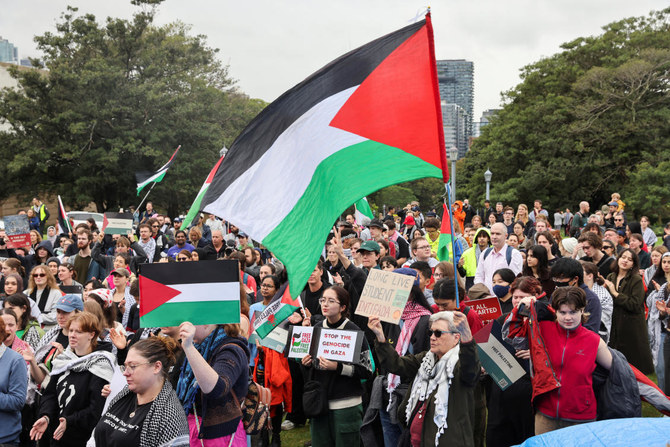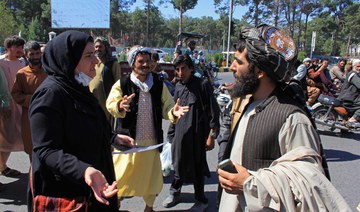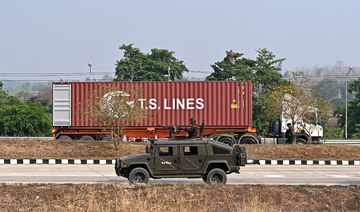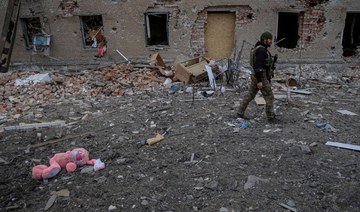KABUL: The Taliban said on Thursday they were preparing to unveil their government, with Afghans hoping it will happen soon as the country urgently needs a new administration after its state institutions collapsed over two weeks ago.
The Taliban took control of Afghanistan earlier this month and seized Kabul on Aug. 15, as US-led forces were completing their withdrawal.
The group that returned to power after 20 years of insurgency, following their removal by a US-led invasion in 2001, is now faced with the responsibility of running a country of 35 million people devastated by decades of war and with an economy on the edge of collapse.
Photos circulated on social media on Thursday showed the Taliban in preparations for a ceremony at the presidential palace in Kabul.
“We were expecting that the government formation would be finalized as soon as possible,” Bilal Karimi, member of the Taliban cultural commission, told Arab News. “Possibly it would be Friday or the upcoming 72 hours.”
While there are many unknowns, fears and hopes regarding the new establishment, most ordinary Afghans long for it to be urgently formed to end a power vacuum.
“In the current situation, we are in an urgent need of a government,” Kabul-based international relations analyst Qais Zaheer told Arab News.
He expressed hope the new administration would be one in which all would find their representation, and that it would obtain international legitimacy.
“On the internal level everyone should see themselves in the government and on the international level, the world should recognize it,” he said.
The Taliban had declared a blanket amnesty, vowing no reprisals against former enemies and Afghans who supported the previous administration, and announced their aim of forming an inclusive Islamic government. It remains unclear to what extent these promises will be kept.
“This government should be inclusive and professional and should assure the people that they are able to serve the nation,” Afghan Civil Society Forum director Aziz Rafee said, adding: “All sides, including the former government officials would be a part of it.”
The international legitimacy of the new government will be crucial, as most payments to foreign aid-dependent Afghanistan have been suspended since the takeover, sending the economy into freefall.
Ali Reza, a 23-year-old shop owner in Kabul, said he hoped the economy would improve with the formation of the new government, as businesses are reeling from the current situation.
“We hope that the new government will provide us with facilities and opportunities,” he said.
The country is facing the possibility of a humanitarian crisis on top of the political and economic situation. The UN has warned that up to half a million Afghans could flee their homeland by the end of the year.
Thousands of people have already left, while the young and educated fear for their future.
“The major issue is that the Taliban would possibly put the new generation under a serious threat,” journalist Nabi Karimi told Arab News.
Those who feel especially threatened are women, whose freedoms were curtailed during the previous Taliban rule of 1996-2001.
“We hope that Taliban fulfil their commitments,” journalist Qudsia Eshaqzai said, adding that she and her colleagues are hoping to resume their professional lives. During their previous reign, the Taliban treated them like second-category citizens.
“The only thing we can do is to continue our hope,” she said. “I hope that soon the situation will change and they will give us the right to work.”
Afghans hope for end to power vacuum as Taliban prepare to announce government
https://arab.news/vmdha
Afghans hope for end to power vacuum as Taliban prepare to announce government

- New government could be revealed as soon as on Friday, says militant group
’Show solidarity’: Pro-Palestinian protesters camp across Australian universities

Pro-Palestinian activists set up an encampment last week outside the sandstone main hall at University of Sydney, one of Australia’s largest tertiary institutions.
Similar camps have sprung up at universities in Melbourne, Canberra and other Australian cities.
Unlike in the US, where police have
forcibly removed
scores of defiant pro-Palestinian protesters at several colleges, protest sites in Australia have been peaceful with scant police presence.
On Friday, protesters rallied to demand University of Sydney divest from companies with ties to Israel, echoing calls from students in the US, Canada and France.
Standing in the chanting crowd of more than 300 with his two-year old son on his shoulders, Matt, 39, said he came to show it was not just students angry at Israel’s actions in Gaza.
“Once you understand what is going on you have a responsibility to try and get involved and raise awareness and show solidarity,” he told Reuters, declining to give his last name.
Several hundred meters away from the Sydney university protest and separated by lines of security guards, hundreds gathered under Australian and Israeli flags to hear speakers say the pro-Palestinian protests made Jewish students and staff feel unsafe on campus.
“There’s no space for anybody else, walking through campus chanting ‘Intifada’ and ‘from the river to the sea’ it does something, it’s scary,” said Sarah, an academic who declined to give her name for fear of repercussions.
University of Sydney vice chancellor Mark Scott told local media on Thursday the pro-Palestinian encampment could stay on campus in part because there was not the violence seen in the US
While several police cars were parked at the entrance to the university, no police were present at either protest.
Long a stalwart ally of Israel, Australia has become increasingly critical of its conduct in Gaza, where an Australian aid worker was killed in an Israeli attack last month.
Pro-Palestinian protesters said the government had not done enough to push for peace and led the crowd in chants against Prime Minister Anthony Albanese and his government.
UK’s Labour claim big early win over PM Sunak’s Conservatives

- Voters cast their ballots on Thursday for more than 2,000 seats on local authorities across England
- Blackpool South was the only parliamentary seat up for grabs after the incumbent, elected in 2019 as a Conservative candidate, quit over a lobbying scandal
LONDON: Britain’s opposition Labour Party won a parliamentary seat in northern England on Friday, inflicting a heavy loss on the governing Conservatives at the start of what could be a bruising set of results for Prime Minister Rishi Sunak.
The thumping victory set the tone for what will be a closely watched two days of results ahead of a full national election this year, which polling shows could put Labour Leader Keir Starmer in power and end 14 years of Conservative government.
Voters cast their ballots on Thursday for more than 2,000 seats on local authorities across England and a handful of high-profile mayoral elections, including in the capital, London.
Blackpool South was the only parliamentary seat up for grabs after the incumbent, elected in 2019 as a Conservative candidate, quit over a lobbying scandal.
Labour candidate Chris Webb won the Blackpool election with 10,825 votes. The Conservative candidate came in second with 3,218.
The defeat in Blackpool and early signs of losses at the council level will boost Labour’s hopes for a sweeping victory over Sunak’s Conservatives in the national election.
“This seismic win in Blackpool South is the most important result today,” Starmer said.
“This is the one contest where voters had the chance to send a message to Rishi Sunak’s Conservatives directly, and that message is an overwhelming vote for change.”
Sunak’s Conservatives are about 20 percentage points behind Labour in most opinion polls for a national election, which Sunak intends to call in the second half of the year.
The first 500 of the more than 2,600 local council results showed Labour making gains at the expense of the Conservatives — in line with finance minister Jeremy Hunt’s pre-vote prediction of significant losses for the governing party.
Although local elections do not always reflect how people will vote in a national contest, a heavy defeat could trigger fresh anger in the Conservative Party over Sunak’s leadership and the prospect of losing power.
The extent of that unrest could hinge on the results of two mayoral elections in which the Conservatives hope to show they can still hold ground in central and northeast England.
The Tees Valley mayoral result is due on Friday, while the West Midlands mayor is to be announced on Saturday. The result in London, where current Labour mayor Sadiq Khan is expected to win another term is also due on Saturday.
More than 2,100 people have been arrested during pro-Palestinian protests on US college campuses

- At least 50 incidents of arrests have happened at 40 different US colleges or universities since April 18
- The demonstrations began at Columbia on April 17 with students calling for an end to the Israel-Hamas war
LOS ANGELES: Police have arrested more than 2,100 people during pro-Palestinian protests at college campuses across the United States in recent weeks, sometimes using riot gear, tactical vehicles and flash-bang devices to clear tent encampments and occupied buildings. One officer fired his gun inside a Columbia University administration building while clearing out protesters camped inside, a prosecutor’s office confirmed.
No one was injured by the officer’s actions late Tuesday inside Hamilton Hall on the Columbia campus, according to Doug Cohen, a spokesperson for District Attorney Alvin Bragg’s office. Cohen said Thursday that the gun did not appear to be aimed at anyone, and that there were other officers but no students in the immediate vicinity. Bragg’s office is conducting a review, a standard practice.
More than 100 people were taken into custody during the Columbia crackdown, just a fraction of the total arrests stemming from recent campus protests over the Israel-Hamas war. A tally by The Associated Press on Thursday found at least 50 incidents of arrests at 40 different US colleges or universities since April 18.
Early Thursday, officers surged against a crowd of demonstrators at University of California, Los Angeles, ultimately taking at least 200 protesters into custody after hundreds defied orders to leave, some forming human chains as police fired flash-bangs to break up the crowds. Police tore apart a fortified encampment’s barricade of plywood, pallets, metal fences and dumpsters, then pulled down canopies and tents.
Like at UCLA, tent encampments of protesters calling on universities to stop doing business with Israel or companies they say support the war in Gaza have spread across other campuses nationwide in a student movement unlike any other this century. Iranian state television carried live images of the police action at UCLA, as did Qatar’s pan-Arab Al Jazeera satellite network. Live images of Los Angeles also played across Israeli television networks.
Israel has branded the protests antisemitic, while Israel’s critics say it uses those allegations to silence opposition. Although some protesters have been caught on camera making antisemitic remarks or violent threats, protest organizers — some of whom are Jewish — call it a peaceful movement to defend Palestinian rights and protest the war.
President Joe Biden on Thursday defended the right of students to peaceful protest but decried the disorder of recent days.
Opinion
This section contains relevant reference points, placed in (Opinion field)
The demonstrations began at Columbia on April 17 with students calling for an end to the Israel-Hamas war, which has killed more than 34,000 Palestinians in the Gaza Strip, according to the Health Ministry there. Israel launched its offensive in Gaza after Hamas militants killed about 1,200 people, mostly civilians, on Oct. 7 and took roughly 250 hostages in an attack on southern Israel.
On April 18, the NYPD cleared Columbia’s initial encampment and arrested roughly 100 protesters. The demonstrators set up new tents and defied threats of suspension, and escalated their actions early Tuesday by occupying Hamilton Hall, an administration building that was similarly seized in 1968 by students protesting racism and the Vietnam War.
Roughly 20 hours later, officers stormed the hall. Video showed police with zip ties and riot shields streaming through a second-floor window. Police had said protesters inside presented no substantial resistance. At some point, the officer’s gun went off inside the building. Cohen, the DA’s spokesperson, did not provide additional details on the incident, which was first reported by news outlet The City on Thursday. The NYPD did not immediately respond to AP’s request for comment.
The confrontations at UCLA also played out over several days this week. UCLA Chancellor Gene Block told alumni on a call Thursday afternoon that the trouble started after a permitted pro-Israel rally was held on campus Sunday and fights broke out and “live mice” were tossed into the pro-Palestinian encampment later that day.
In the following days, administrators tried to find a peaceful solution with members of the encampment and expected things to remain stable, Block said.
That changed late Tuesday, he said, when counterdemonstrators attacked the pro-Palestinian encampment. Campus administrators and police did not intervene or call for backup for hours. No one was arrested that night, but at least 15 protesters were injured. The delayed response drew criticism from political leaders, including California Gov. Gavin Newsom, and officials pledged an independent review.
“We certainly weren’t thinking that we’d end up with a large number of violent people, that hadn’t happened before,” Block said on the call.
By Wednesday, the encampment had become “much more of a bunker” and there was no other solution but to have police dismantle it, he said.
The hourslong standoff went into Thursday morning as officers warned over loudspeakers that there would be arrests if the crowd — at the time more than 1,000 strong inside the encampment as well as outside of it — did not disperse. Hundreds left voluntarily, while another 200-plus remained and were ultimately taken into custody.
Meanwhile, protest encampments at other schools across the US have been cleared by police — resulting in more arrests — or closed up voluntarily. But University of Minnesota officials reached an agreement with protesters not to disrupt commencements, and similar compromises have been made at Northwestern University in suburban Chicago, Rutgers University in New Jersey and Brown University in Rhode Island.
Ariel Dardashti, a graduating UCLA senior studying global studies and sociology, said no student should feel unsafe at school.
“It should not get to the point where students are being arrested,” Dardashti said on campus Thursday.
Myanmar junta bans men from applying to work abroad

- Ruling junta's plan to call up all men to serve in the military for at least two years has sent thousands queuing for visas outside foreign embassies in Yangon
YANGON: Myanmar’s junta has suspended the issuing of permits for men to work abroad, it said, weeks after introducing a military conscription law that led to thousands trying to leave the country.
The junta, which is struggling to crush widespread armed opposition to its rule, in February said it would enforce a law allowing it to call up all men to serve in the military for at least two years.
The move sent thousands queuing for visas outside foreign embassies in Yangon and others crossing into neighboring Thailand to escape the law, according to media reports.
The labor ministry has “temporarily suspended” accepting applications from men who wish to work abroad, the ministry said in a statement posted by the junta’s information team late Thursday.
The measure was needed to “take more time to verify departure processes and according to other issues,” it said, without giving details.
More than 4 million Myanmar nationals were working abroad in 2020, according to an estimate by the International Labour Organization citing figures from the then-government.
Analysts say many more work abroad off the books.
The military service law was authored by a previous junta in 2010 but was never brought into force.
It allows the military to summon all men aged 18-35 and women aged 18-27 to serve for at least two years.
That law also has a stipulation that, during a state of emergency, the terms of service can be extended up to five years and those ignoring a summons to serve can be jailed for the same period.
The Myanmar junta announced a state of emergency when it seized power in 2021, with the army recently extending it for a further six months.
A first batch of several thousand recruits has already begun training under the law, according to pro-military Telegram accounts.
A junta spokesman said the law was needed “because of the situation happening in our country,” as it battles both so-called People’s Defense Forces and more long-standing armed groups belonging to ethnic minorities.
Around 13 million people will be eligible to be called up, he said, though the military only has the capacity to train 50,000 a year.
More than 4,900 people have been killed in the military’s crackdown on dissent since its February 2021 coup and more than 26,000 others arrested, according to a local monitoring group.
Send us Patriots: Ukraine’s battered energy plants seek air defenses against Russian attacks

- Ukraine's foreign minister has said half of the country’s energy system has been damaged by Russian attacks
- Russian President Vladimir Putin has framed the attacks as retaliation for Ukrainian strikes on Russian oil refineries
KYIV, Ukraine: At a Ukrainian power plant repeatedly hit by Russian aerial attacks, equipment department chief Oleh has a one-word answer when asked what Ukraine’s battered energy industry needs most: “Patriot.”
Ukrainian energy workers are struggling to repair the damage from intensifying airstrikes aimed at pulverizing Ukraine’s energy grid, hobbling the economy and sapping the public’s morale. Staff worry they will lose the race to prepare for winter unless allies come up with air-defense systems like the US-made Patriots to stop Russian attacks inflicting more destruction on already damaged plants.
“Rockets hit fast. Fixing takes long,” Oleh said in limited but forceful English.
The US has sent Ukraine some Patriot missile systems, and said last week it would give more after entreaties from President Volodymyr Zelensky.
The Associated Press on Thursday visited a plant owned by DTEK, the country’s biggest private energy supplier, days after a cruise-missile attack left parts of it a mess of smashed glass, shattered bricks and twisted metal. The coal-fired plant is one of four DTEK power stations struck on the same day last week.
The AP was given access on the condition that the location of the facility, technical details of the damage and workers’ full names are not published due to security concerns.
During the visit, State Emergency Service workers in hard hats and harnesses clambered atop the twisted roof of a vast building, assessing the damage and occasionally dislodging chunks of debris with a thunderous clang.
Ukrainian Foreign Minister Dmytro Kuleba told Foreign Policy magazine that half of the country’s energy system has been damaged by Russian attacks.
DTEK says it has lost 80 percent of its electricity-generating capacity in almost 180 aerial attacks since the start of Russia’s full-scale invasion in 2022. It estimates that repairing all the damaged plants would take between six months and two years — even if there are no more strikes.
Shift supervisor Ruslan was on duty in the operations room when the air alarm sounded. He sent his crew to a basement shelter but remained at his post when the blast struck only meters (yards) away.
He rushed out to darkness, dust and fire. He said he wasn’t scared because “I knew what I needed to do” – make sure his team was OK and then try to help put out the flames.
Russia pummeled Ukraine’s energy infrastructure to devastating effect during the “blackout winter” of 2022-23. In March it launched a new wave of attacks, one of which completely destroyed the Trypilska power plant near Kyiv, one of the country’s biggest.
Russian President Vladimir Putin has framed the attacks as retaliation for Ukrainian strikes on Russian oil refineries.
Oleh said the Russians are “learning all the time” and adapting their tactics. Initially they targeted transformers that distribute power; now they aim for the power-generating equipment itself, with increasing accuracy. The Russians also are sending growing numbers of missiles and exploding drones to exhaust Ukraine’s air defenses, and striking the same targets repeatedly.
DTEK executive director Dmytro Sakharuk said in March that out of 10 units the company had repaired after earlier strikes, two-thirds had been hit again.
More Russian missiles have been getting through in recent months as Ukraine awaited new supplies from allies, including a $61 billion package from the US that was held up for months by wrangling in Congress. It was finally approved in April, but it could be weeks or months before all the new weapons and ammunition arrives.
Ukraine’s energy firms have all but exhausted their finances, equipment and spare parts fixing the damage Russia has already wrought. The country’s power plants urgently need specialist equipment that Ukraine can no longer make at sufficient speed and scale.
Some 51 DTEK employees have been wounded in attacks since 2022, and three have been killed. Staff say they keep working despite the danger because they know how crucial their work is.
Machine operator Dmytro, who was on shift during the recent attack and took shelter in the basement, said that when he emerged, “my soul was bleeding when I saw the scale of the destruction.”
He thought of the many people who had poured heart and soul into building the mammoth power plant.
“This was destroyed in a few seconds, in an instant,” he said.
Dmytro, who worked at Ukraine’s Zaporizhzhia nuclear power plant before it was seized by Russia, said he would continue to show up for work every day, “as long as I’m able.”
“It’s our duty toward the country,” he said



















